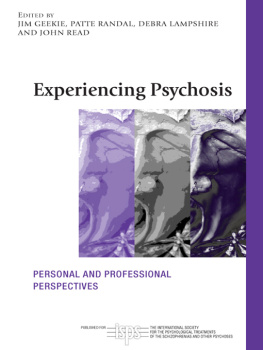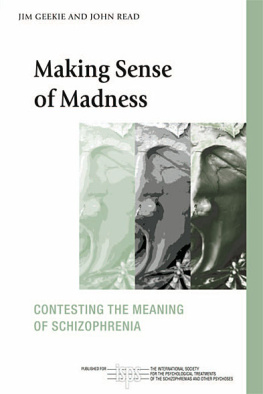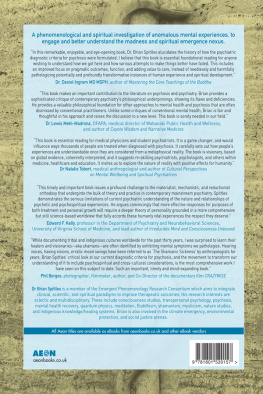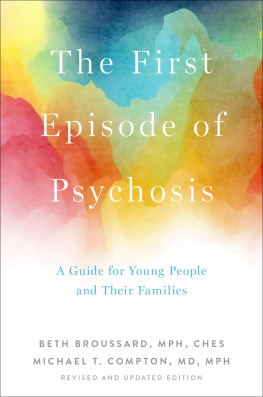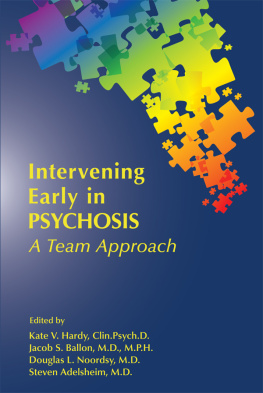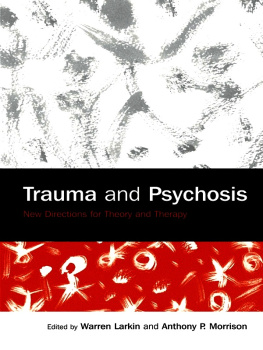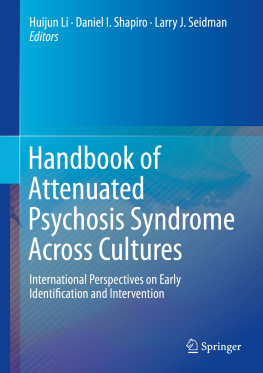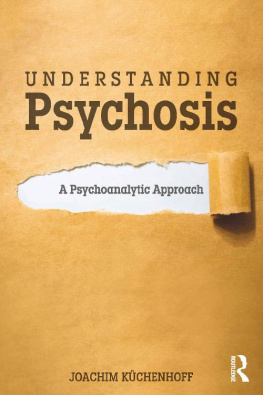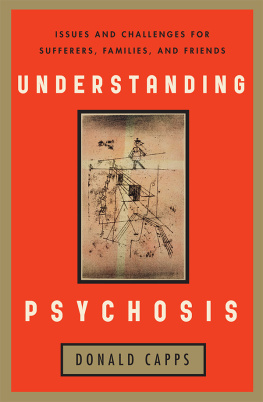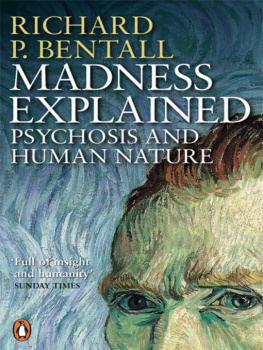Tables and figures
Tables
Figures
The International Society for the Psychological
Treatments of Schizophrenias and Other
Psychoses book series
Series editor: Brian Martindale
The ISPS (the International Society for the Psychological Treatments of the Schizophrenias and other Psychoses) has a history stretching back more than fifty years during which it has witnessed the relentless pursuit of biological explanations for psychosis. The tide is now turning again. There is a welcome international resurgence of interest in a range of psychological factors in psychosis that have considerable explanatory power and also distinct therapeutic possibilities. Governments, professional groups, users and carers are increasingly expecting interventions that involve more talking and listening. Many now regard skilled practitioners in the main psychotherapeutic modalities as important components of the care of the seriously mentally ill.
The ISPS is a global society. It is composed of an increasing number of groups of professionals, family members, those with vulnerability to psychosis and others, who are organised at national, regional and more local levels around the world. Such persons recognise the potential humanitarian and therapeutic potential of skilled psychological understanding and therapy in the field of psychosis. Our members cover a wide spectrum of approaches from psychodynamic, systemic, cognitive, and arts therapies to the need-adaptive approaches, group therapies and therapeutic institutions. We are most interested in establishing meaningful dialogue with those practitioners and researchers who are more familiar with biological based approaches. Our activities include regular international and national conferences, newsletters and email discussion groups in many countries across the world.
One of our activities is in the field of publication. Routledge has recognised the importance of our field, publishing the ISPS journal, Psychosis: Psychological, Social and Integrative Approaches ( www.isps.org/journal.shtml ). The journal complements Routledges publishing of the ISPS book series, which started in 2004. The books aim to cover many topics within the spectrum of the psychological therapies of psychosis and their application in a variety of settings. The series is intended to inform and further educate a wide range of mental health professionals as well as those developing and implementing policy.
Acknowledgements
The editors wish to acknowledge the wisdom and courage of those who agreed to share their stories for inclusion in this book, in the form of both first-person accounts and research looking at subjective experience. We hope these stories can inspire others, as indeed they have inspired us.
List of contributors
Alan Barnard is a Senior Lecturer in the School of Nursing and Midwifery at Queensland University of Technology (QUT), Brisbane, Australia. He is a member of the QUT Institute for Health and Biomedical Innovation and is a Research Fellow at a major teaching hospital in Brisbane. He has qualifications in nursing, psychology, education and philosophy and has over 30 years research, teaching, leadership and clinical experience. His research and scholarship interests relate to patient-focused care, chronic illness and interpretive qualitative research. He has been the recipient of research funding and has extensive publications in peer-reviewed journals. He is an experienced qualitative researcher and his recent research and publications include papers relating to the broad issue of the experience of person-focused care and health care delivery.
Vanessa Beavan is a Clinical Psychologist working in the Early Psychosis Service at St Lukes Community Mental Health Centre, Auckland, New Zealand. She is Co-Chair of the New Zealand Hearing Voices Network and Secretary of the International Society for the Psychological treatments of the Schizophenias and other Psychoses New Zealand (ISPS-NZ).
Egan Bidois is a Mental Health (MH) Researcher and Liaison worker, and Cultural and Consumer Advisor to numerous bodies on national MH development from a Mori perspective. With constant lived experience of psychosis and paranoid schizophrenia, Egan maintains his wellness independent of MH services.
Wilma Boevink works as a researcher at Trimbos-institute in Utrecht, the Netherlands and as a professor of recovery in Hanze University in Groningen, the Netherlands. She is chair of Weerklank (resonance), the Dutch organization for voice hearers. She is a member of the supervisory board of The Netherlands Center for Chronic Early Childhood Traumatization (LCVT).
Rory Byrne is a researcher working for the NHS and the University of Manchester, UK, conducting research into Early Detection and Intervention for Psychosis, and the prevention or treatment of Psychosis using psychological therapies, rather than antipsychotic medication.
Dr. Michelle Campbell is a clinical psychologist currently working in an early detection team for psychosis in Leigh, UK. She has a particular interest in understanding psychosis and it was while working on her PhD that she recognized the value of exploring peoples narratives of their experiences.
Dirk Corstens works as a psychiatrist and psychotherapist at RIAGG Maastricht in Maastricht, the Netherlands. He is chair of Intervoice, an international emancipatory organization for voice hearers.
Larry Davidson is Professor of Psychiatry at the Yale University School of Medicine, where he directs the Program for Recovery and Community Health. His research interests lie in processes of recovery in serious mental illness and promoting recovery-oriented care.
Jacqui Dillon is national Chair of the Hearing Voices Network in England, a Director of Intervoice and an Honorary Lecturer in Clinical Psychology at the University of East London. She has published numerous articles and papers and is co-editor of Living with Voices.
Jim Geekie is a Clinical Psychologist working in the Early Psychosis Service at St Lukes Community Mental Health Centre, Auckland, New Zealand. Along with John Read, he is co-author of Making Sense of Madness (Routledge, 2009).
Kate V. Hardy is a Clinical Psychologist working with the PREP programa community-academic early psychosis service in the Bay Area, California and at the University of California, San Francisco.
Ingo Lambrecht is a Senior Clinical Psychologist for Psychotherapy Specialist Services, Auckland District Health Board, Auckland, New Zealand.
Debra Lampshire is an Experience-Based Expert. She has used her own lived experience of recovery as a voice hearer, incorporating this with experiences of consumers into clinical and educational settings. Debra currently works for Auckland District Health Board and Auckland University, leading the development in service-user involvement and psychological strategies.
Arnhild Lauveng is a clinical psychologist, currently doing a PhD at R & D Department, Mental Health Sevices, Akershus University Hospital, Norway. She is the author of three books. From 1988 to 1998 she was diagnosed with schizophrenia and spent most of this time in psychiatric wards. Today she is completely rehabilitated and off medications.
James Le Lievre has had a core interest in schizophrenia from the time a person well known to him was diagnosed. He has worked with diagnosed people voluntarily, at a clubhouse, in a private psychiatric hospital, and in his PhD studies on the subjective experience of emotional expression.

